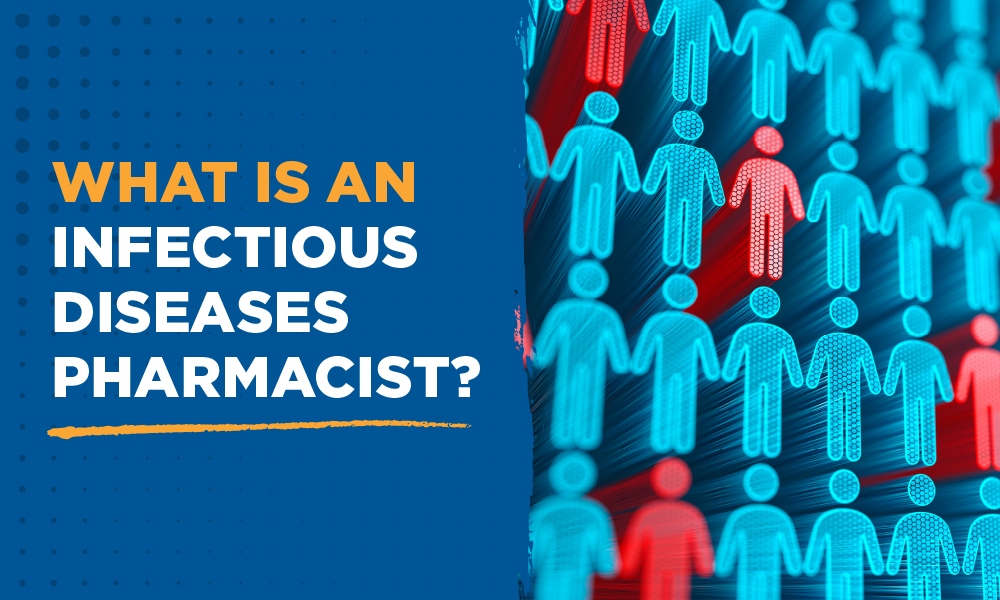
When exploring career paths, it’s best to talk to a professional in the field. Fortunately, Concordia University has Dr. Lynne Fehrenbacher, PharmD, BCPS-AQ ID, as a professor in the School of Pharmacy. Dr. Fehrenbacher also serves as a preceptor for pharmacy APPE students on infectious diseases rotations and for pharmacy residents.
Apart from her faculty role, she also practices as infectious diseases (ID) and antimicrobial stewardship clinical pharmacist at Aurora St. Luke’s Medical Center in Milwaukee, WI. Actually, she helps support antimicrobial stewardship across all of the Aurora hospitals in Wisconsin. Check out her insight as to why being an ID pharmacist is such an “infectious” career path.
What is an Infectious Diseases and Antimicrobial Stewardship Pharmacist?
An ID pharmacist is usually part of a multidisciplinary team working to care for patients with infections. Their main focus is ensuring that medications (antimicrobials) prescribed to treat a patient’s infection are optimized for the best possible outcome.
And just as importantly, ID pharmacists are champions for antimicrobial stewardship, which means using antimicrobials to appropriately treat infections only when they’re indicated. Since there isn’t an endless supply of new antimicrobials in the drug pipeline, it’s important to use existing medications wisely to preserve them for the future.
In this role, we track antimicrobial use to identify areas for improvement and trending antimicrobial resistance. And it’s critical that we educate caregivers and patients about the importance of using antibiotics appropriately.
Evaluating the ‘bugs and drugs’
We use the electronic health record (EHR) system to extract real-time reports based on either positive culture results (the ‘bugs’) or selected antimicrobial medications (the ‘drugs’). We then review patients’ therapy plans and identify whether they are on optimal drug therapy to cover their bugs. Interventions that we make regularly include the following.
- Identifying safety or efficacy concerns related to antimicrobial dosing and working to optimize a patient’s dose.
- Recommending de-escalation (changing from a broader coverage antimicrobial to a more targeted option) when culture information is available.
- Assisting with therapy selection when a patient is infected with difficult-to-treat organisms that may be resistant to one or several antimicrobials.
Antimicrobial Stewardship
Infectious disease pharmacists are a key part of antimicrobial stewardship teams. These teams work on projects to identify areas to improve antimicrobial use. This can involve working in partnership with infection prevention teams to track and trend resistant organisms.
It may include doing patient-based research to develop protocols for antimicrobial dosing or infection-specific recommendations within a hospital. The main goal is simple: optimize patient outcomes while using antimicrobials in a way that will minimize the risk of antimicrobial resistance.
Teaching and Learning
There are usually multiple pharmacy residents and a 4th-year pharmacy student on rotation with our service at Aurora Healthcare each month. We do patient rounds together and work to develop their knowledge and confidence through exposure to a variety of patient situations and infection types.
Using a layered learning approach, residents, students, and preceptors all teach and learn from one another in a collaborative environment. In addition, we work closely with physicians, physician assistants, nurse practitioners, microbiology laboratory technicians, and other health professionals daily. We are a reference for one another and infectious diseases pharmacists serve as the drug experts on a healthcare team.
How do I become an Infectious Diseases Pharmacist?
First, you must receive a Doctor of Pharmacy (PharmD) degree. Following graduation, you’ll complete a PGY-1 pharmacy residency followed by either a PGY-2 ID pharmacy residency or a research fellowship. Most ID pharmacists who want to practice in patient care traditionally choose the PGY-1/PGY-2 pathway, while those who are more interested in research will opt for pursuing a fellowship.
While not required, most ID pharmacists will have advanced certifications such as board certification with the Board of Pharmaceutical Specialties (BPS). As a pharmacist who has been practicing for greater than 20 years, Dr. Fehrenbacher took an exam in addition to her licensing exams and is a Board Certified Pharmacotherapy Specialist (BCPS).
In addition, she submitted a portfolio for review and received Added Qualifications in Infectious Diseases (AQ-ID). While the AQ-ID will be sunsetting, there is a new BPS board exam to award Board Certification in Infectious Diseases Pharmacotherapy (BCIDP) that new ID pharmacists can take to become certified.
Professional Service and Advocacy
Dr. Fehrenbacher has chosen multiple ways to serve and advocate for those with infectious diseases.
- She is an active member of the Society of Infectious Diseases Pharmacists (SIDP) and has chaired several committees over the years.
- She is the past chair of the Education Committee, which is responsible for coordinating educational activities not only for members but for other pharmacists and members of healthcare teams as well.
Being involved in organizations has allowed her to expand both her network and professional involvement locally and internationally. Whatever area of pharmacy practice you pursue, align yourself with a professional organization that will:
- Support your development
- Allow you to network and mentor others
- Work to advocate for the advancement of the profession for the good of those whom we serve
Dr. Fehrenbacher is willing to answer any further questions and offer insight to those interested in becoming infectious diseases pharmacists. You’re welcome to contact her below to discuss how this field can provide you a rewarding career for a lifetime.